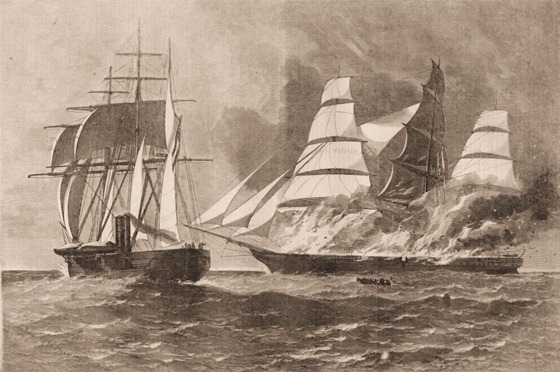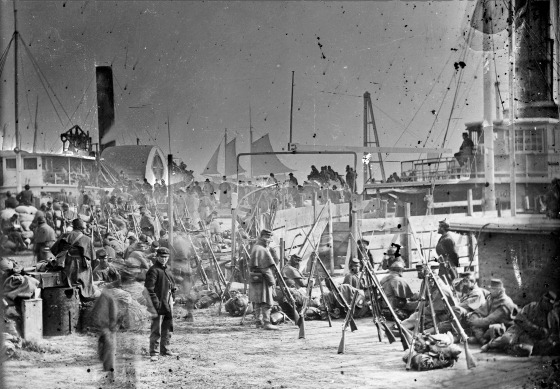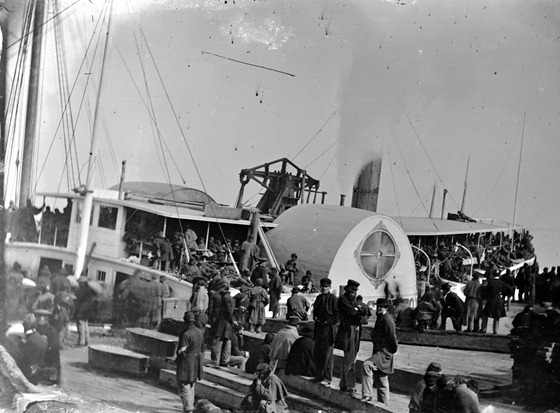
Destruction of the Clipper Ship “Jacob Bell” by the British Pirate “Florida.”
Published in the March 21st, 1863 issue of Harper’s Weekly.
______________
Account in the NY Times, March 15, 1863:
DOINGS OF THE PIRATES.; The Capture of the Jacob Bell by the Florida. STATEMENTS OF PASSENGERS.
HALIFAX, Tuesday, March 10.
The following account of the capture of the ship Jacob Bell, from Swatow, China, bound to NewYork, by the Confederate, privateer Florida, is from Mrs. WILLIAMS, whose husband is Commissioner of Customs to the Imperial Government of China, and Master CHAS. W.JOHNSON, passengers on board the Bell:
The Jacob Bell, 1,600 tons, Capt. FRISBY, with a full cargo of teas, cassia, camphor, cassia oil, &c., &c., valued at $1,500,000, part of it British property, at about noon on the 12th ult., about 100 miles from Sombrero, discovered a steamer in pursuit under a full head of steam, and all sail set. After six hours’ chase, the steamer fired a shot which struck about twice the length of the ship astern, when Capt. FRISBY ordered his ship hove to. The steamer carried the National flag. After sailing around the Bell three times, she presented a broadside, run up the rebel flag and sent a boat’s crew on board; she proved to be the rebel privateer Florida. After examining the Bell’s papers, she was declared a prize to the Confederate States. The officers, crew and passengers of the Bell were immediately transferred to the Florida, being allowed only half an hour to collect a few necessary articles, the prize crew appropriating whatever of the remaining articles, including many valuable curiosities, &c., pleased their fancy. The Florida immediately started in pursuit of a schooner, giving orders to the prize master to seer a certain course to meet the Florida the following morning. The schooner escaped in the darkness. The Florida and Jacob Bell met the morning of the 13th, when the prize crew were taken off and the ship fired. The Florida narrowly escaped being run down by the Bell, she having banked her fires, the crew were so intently engaged in transferring plunder as to quite neglect the management of the ship, which, with sails set, bore down on the Florida, the rigging of which had to be manned and the Bell shoved off. She was then abandoned and burned to the water’s edge.
The same day the Florida brought to a French bark, boarded and examined her papers, afterwards chased a schooner, which escaped. On the 17th brought to the Danish bark Morning Star, which consented to receive the crew and passengers of the Bell and land them at St. Thomas.
Immediately on intelligence reaching St. Thomas, the Federal man-of-war Alabama started in pursuit. The Vanderbilt would leave as soon as she had coaled.
The Florida carries six 68-pounders and two chasers, 120-pounders. The crew numbers 160 all told. Officers quite young; crew principally Irish, some of whom expressed a desire to leave her.
Capt. MAFFIT and officers of the Florida showed them every attention and seemed to be desirous of making their situation as comfortable as possible. Capt. MAFFIT mentioned the Vanderbilt having passed him, but it being night, and the Florida lying so low, with sails furled and smoke-stack down, she was not discovered.











